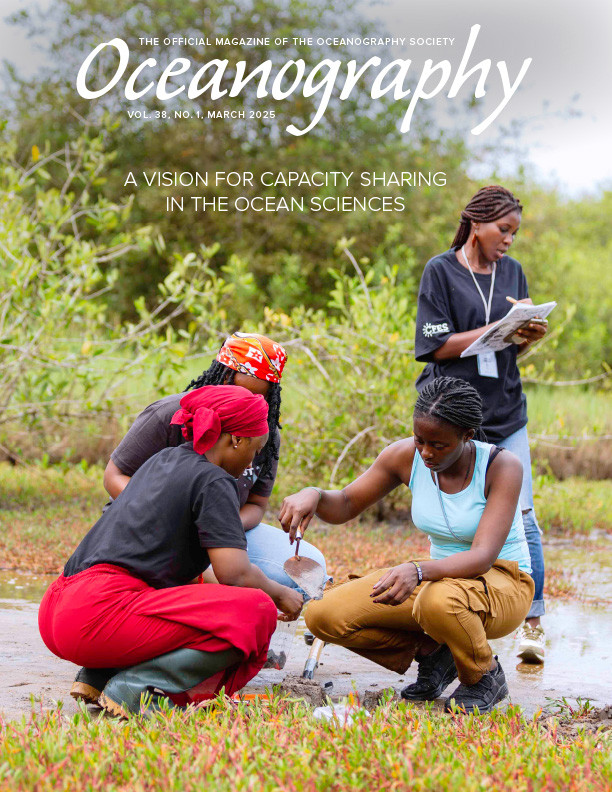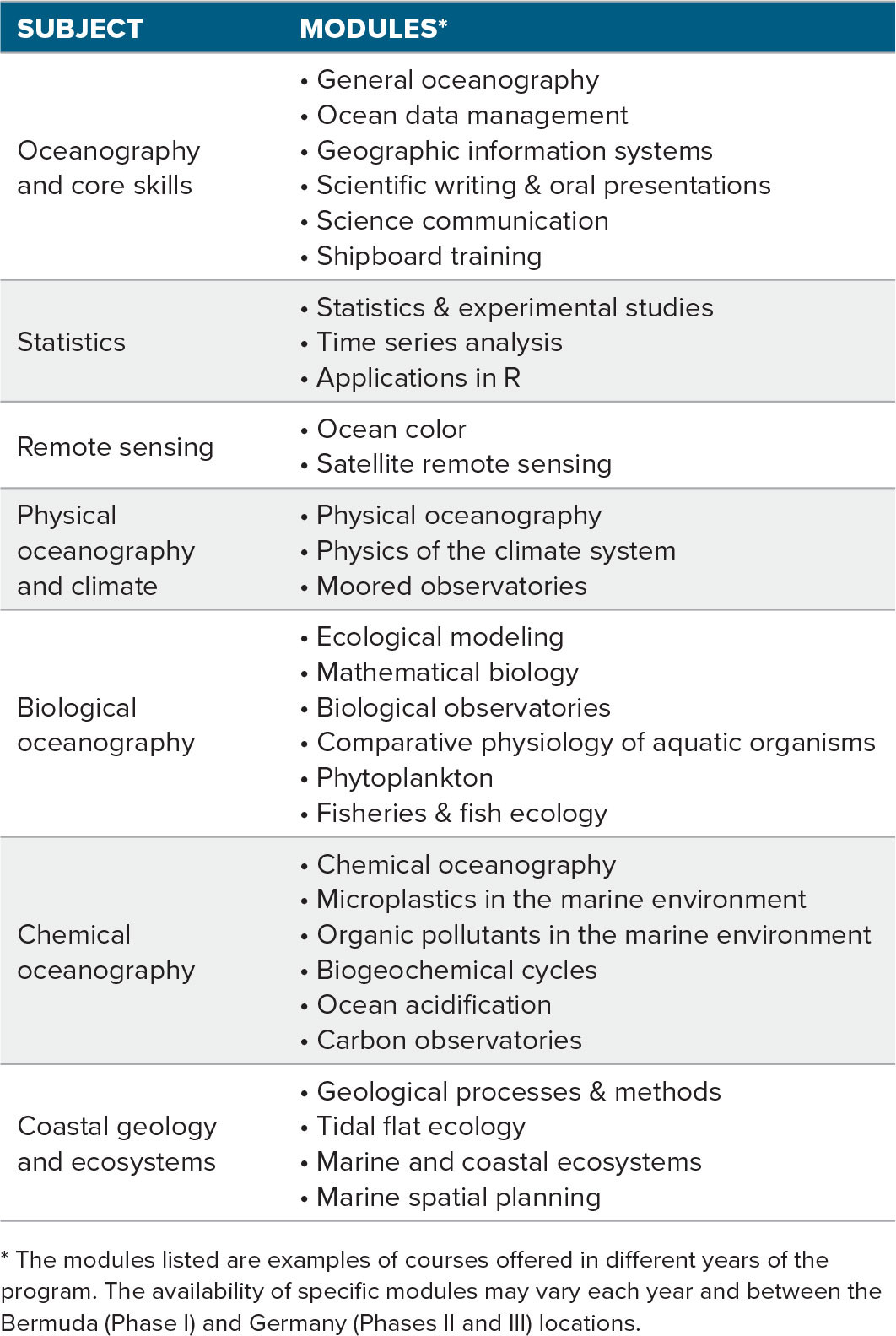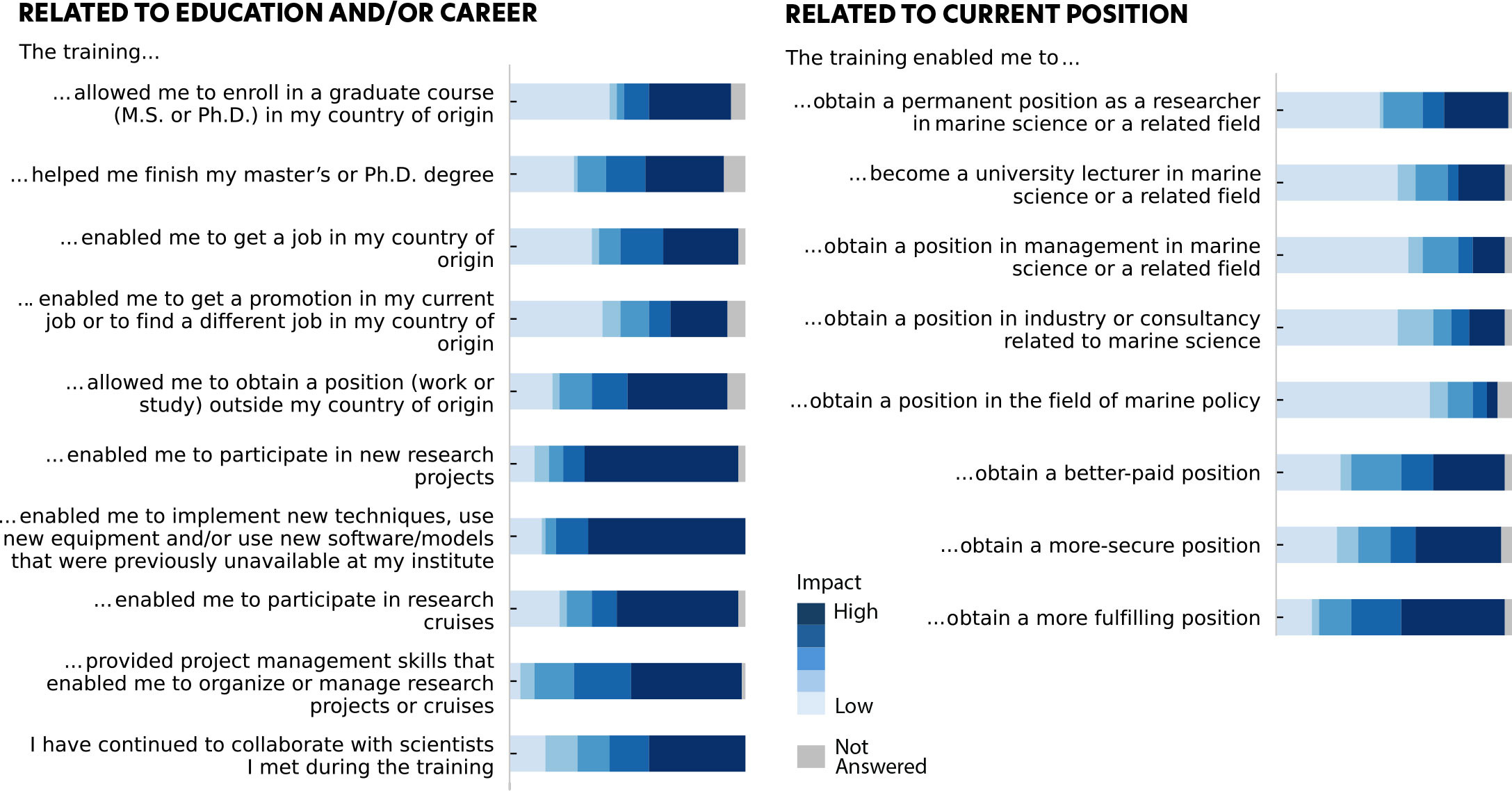Full Text
Introduction
The Nippon Foundation–Partnership for Observation of the Global Ocean (NF–POGO) Centre of Excellence (CofE, https://pogo-ocean.org/capacity-development/centre-of-excellence/) has provided advanced training in observational oceanography since 2008. Each year, a cohort of 10 scholars is selected to participate in this 10-month postgraduate-level program, which consists of expert-led instruction and hands-on experience. The CofE targets early-career ocean professionals (ECOPs), primarily from developing economies, and addresses global disparities in oceanographic expertise and resources, offering scholars unique opportunities.
The NF–POGO CofE partners with leading ocean science institutions—members of POGO—to host the training for three- to five-year terms. Since its inception, the CofE program has been hosted by the Bermuda Institute of Ocean Sciences (Phase I: 2008–2012) and the Alfred Wegener Institute for Polar and Marine Research (Phase II: 2013–2019 and Phase III: 2020–2024). The program is currently in Phase IV, which began in October 2024 and is hosted by a Canadian consortium consisting of the Ocean Frontier Institute, Dalhousie University, Fisheries and Marine Institute of Memorial University, and the Hakai Institute, with scholars rotating among these institutions. The program provides full support for travel and living expenses, enabling scholars to focus on their training without financial burdens.
During Phases I, II, and III, the program trained 140 researchers from 50 countries. Alumni remain engaged through the NF–POGO Alumni Network for the Ocean (NANO), established in 2010 to maximize the impact of training via networking, collaborative outreach, and research (e.g., Krug et al., 2021).
This article evaluates the program’s impact based on feedback from former trainees. Quantitative and qualitative assessments were derived from a POGO-designed survey, supplemented by the authors’ reflections on challenges faced in their home countries. These insights highlight the CofE’s role in developing oceanographic expertise and identify opportunities to amplify its impact through alumni contributions.
Overview of the CofE Program
The CofE program is highly competitive, with 10 scholars selected annually from hundreds of applicants. Calls for applications are announced via mailing lists, newsletters, and social media. The program provides full financial support, including travel, visa costs, accommodation, subsistence, and insurance, enabling scholars to focus on their training. A dedicated coordination team ensures a supportive experience for scholars throughout the program.
The curriculum is tailored to the host institution’s expertise and features introductory courses, advanced topics, and independent research projects. It emphasizes core skills, such as scientific writing, presentations, statistics, and data management, as well as specialist topics like instrumentation, remote sensing, and numerical modeling (Table 1). Additionally, scholars develop and enhance their at-sea skills by participating in scientific cruises.
TABLE 1. Examples of modules offered during Phases I, II, and III (2008–2024) of the NF–POGO Centre of Excellence in Observational Oceanography. > High res table |
Modules are delivered by senior and emeritus researchers from the host or visiting institutions. Each module typically spans two to three weeks and combines theoretical foundations with hands-on training, including in situ sampling, laboratory experiments, and data analysis. Scholars demonstrate their understanding through presentations, assignments, and exams that are used to assess performance and assign grades
In the final months, each scholar undertakes an independent research project, addressing a scientific question under the guidance of an expert supervisor. Many of these projects have contributed to peer-reviewed publications, showcasing the program’s impact on scientific advancement.
Impact of the Program
Since 2017, POGO has conducted surveys to evaluate the effectiveness of the training. A total of 66 responses were collected from CofE past alumni across five regions: Africa (19), Asia (24), Europe (8), Latin America (14), and Oceania (1), with a gender balance of 45% female and 55% male. The majority of respondents were aged 26–30 (48%) or 25 and under (17%) during their training. Prior to training, participants were primarily students (52%) or researchers (26%), holding either master’s (65%), bachelor’s (18%), or doctoral (17%) degrees.
The survey responses indicate that the CofE has had a profoundly positive impact on the careers of its alumni, as evidenced by significant advancements in positions and increased confidence (Figure 1). Notably, 73% of respondents reported sharing their knowledge with students and colleagues through lectures, seminars, and supervision, demonstrating the program’s multiplier effect.
|
|
Testimonials from survey respondents highlight CofE’s transformative impact on their careers and personal lives. The program’s comprehensive, multidisciplinary approach is credited with helping alumni acquire broad skills, build international connections, and secure PhD positions and research roles. The training has also bolstered their confidence, creativity, and problem-solving abilities. Many respondents expressed gratitude for the opportunities the program provided, describing it as a foundation for their future careers and a catalyst for lasting global professional and personal relationships.
The program’s immersive experience in an English-speaking environment provides additional benefits. It significantly improves scholars’ language proficiency, boosts confidence in engaging with the international scientific community, and helps overcome language barriers. This facilitates effective communication, broadens international networking, and opens further academic and professional opportunities. Furthermore, the shared experience of living and working abroad fosters camaraderie among scholars, creating lasting bonds and a global network of professional contacts, such as through NANO.
Achievements and Opportunities for Maximizing the Program’s Impact
Through exposure to expert-led instruction and hands-on training in state-of-the art laboratories and on research vessels, scholars gain invaluable skills that empower them to make significant contributions to the global ocean science community. However, upon returning to their home countries, alumni often face challenges in fully applying their newly developed skills, including limited job opportunities and difficulties in securing funding for research infrastructure
To address these challenges, NANO supports alumni through various initiatives, such as funding projects that enhance coastal ocean monitoring (Krug et al., 2021) and developing low-cost tools for citizen science (Sarker et al., 2024). These initiatives not only boost alumni careers but also support their progression into leadership roles. It is hoped that the value of their work will be recognized by their home institutions and governments, leading to long-term funding and support for sustained ocean monitoring efforts.
Additionally, NF–POGO has partnered with alumni to expand capacity development regionally by organizing training in alumni’s home countries, with notable collaborations in Bangladesh, India, and Togo. These short-term trainings, which feature multiple CofE alumni as instructors, incorporate a combination of theoretical foundations, hands-on training, and project-based learning. These efforts demonstrate that the CofE model can be effectively adapted to smaller-scale initiatives in various contexts, even with limited funding.
The impact of belonging to a selective group and witnessing the dedication of leading experts to capacity development has a lasting effect on the alumni, who often become strong advocates for capacity sharing themselves. Examples include:
- Author Nimit’s co-founding of the world’s first basin-specific ECOP network inspired by NANO (Singh et al., 2016).
- Author Panassa’s essential role in establishing Togo’s first undergraduate course in oceanography at the University of Kara, attracting students from across West Africa.
- Author Sarker’s organization of the first International Symposium on Marine Resource Management of Bangladesh that attracted 200 Southeast Asia participants from academia, governments, and nongovernmental organizations.
- Involvement of authors Krug, Nimit, and Krieger in the online mentorship program of the Trevor Platt Science Foundation, which supports ECOPs as mentors.
- Author Krug has been coordinating NANO since its inception and continues to oversee its activities, while also managing the capacity development programs of POGO since 2019.
While these achievements are significant, we suggest further improvements that can enhance the program’s impact. A more targeted focus on coastal oceanography and ocean governance could better equip alumni to address challenges they face in their home countries. Offering specialized training in these areas would enable scholars to manage and conserve marine resources effectively and contribute to the creation and implementation of policies and regulatory frameworks.
Furthermore, given the high costs of ocean observation, introducing low-cost ocean observation methods could empower scholars to build sustainable observation platforms in resource-limited settings. Additionally, integrating knowledge from traditional local communities into ocean observation could enhance scholar’s skills for working with more holistic and sustainable approaches to ocean monitoring and conservation. Training scholars to recognize, respect, and incorporate this knowledge into their research could further enhance the program’s impact and contribute to more inclusive and culturally relevant ocean science.
Conclusion
The NF–POGO CofE program has had a transformative impact on its alumni, equipping them with the skills, networks, and confidence to excel in ocean sciences and beyond. Many alumni now lead trainings and mentor the next generation, inspired by the CofE’s emphasis on knowledge-sharing and global collaboration. The enduring bonds formed at the CofE, strengthened through NANO, have fostered lasting friendships and collaborations, enhancing contributions to the field across countries. This manuscript serves as a testament to these impacts.
We affirm that the CofE is an exceptional initiative that significantly boosts ocean observation capacity and ECOPs’ careers, particularly in developing regions where support is crucial. We are grateful for the opportunities we received and hope that future ECOPs, especially those from developing countries, can benefit from similar experiences.
Acknowledgments
This manuscript is dedicated to the memory of Prof. Trevor Platt, an advocate for capacity development in ocean science, and a beloved mentor to all co-authors, whose legacy continues to inspire us. We thank the Nippon Foundation, Partnership for Observation of the Global Ocean, Bermuda Institute of Ocean Sciences, Alfred Wegener Institute for Polar and Marine Research, Ocean Frontier Institute, Dalhousie University, Fisheries and Marine Institute of Memorial University, and Hakai Institute for supporting this initiative. The views expressed in this manuscript reflect the experiences of the authors and anonymous survey respondents and do not necessarily represent those of these organizations. We also thank the anonymous reviewers for their constructive feedback, which has improved the manuscript.



